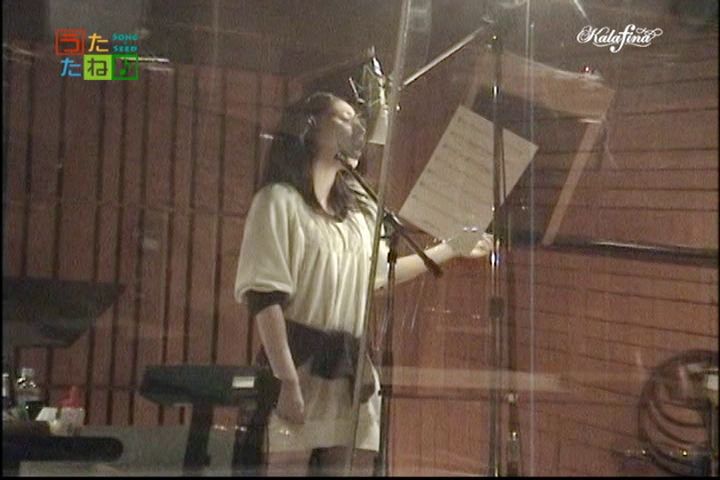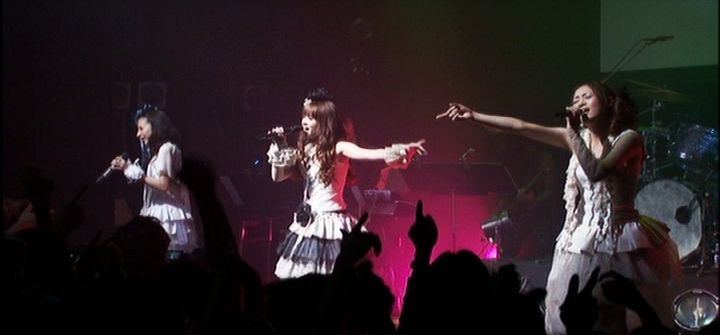Looking back on the Kalafina Progressive single and the 2009 Closed Premium Live
Of all the singles in Kalafina’s back catalogue, Progressive is a particularly interesting one. It wasn’t a movie or TV tie-in, so I guess that the record label felt the need to include extra incentives to help boost sales.
The regular edition features the title track, an instrumental “karaoke” version, and a non-album “B-side” (in this case, the haunting Utsukushisa). The limited edition adds more content than was usual for releases like this: there is a music video, plus some interviews and “behind the scenes” making-of footage from a TV broadcast that aired in 2009, shortly after their Seventh Heaven album was released.
The documentary shows some day-to-day scenes like clothes shopping and studio rehearsals, and the interviews cover a lot of questions that the band members have answered elsewhere. One scene did jump out at me though: it shows Hikaru in a recording booth while Yuki Kajiura directs her from the studio’s control room. This short snippet seems to show the session where the lead vocal for the ARIA single was recorded back in 2008, which would have been one of the first – if not THE first – song that Hikaru was involved in. From the perspective of a long-standing fan, it’s nice that someone had their camera on hand to capture that moment for posterity:

The coolest thing of all is an excerpt from the “Closed Premium Live” concert that was held in May 2009 at Shibuya O-West, a small 600-capacity venue in Tokyo. Only three of the songs are included on this DVD: Love Come Down, Mata Kaze ga Tsuyoku natta and Ongaku. I’ve no idea if the rest of the show was recorded as well, or whether it was released separately. I’ve not seen or heard about it, so I can only assume that it’s locked away in Sony Music’s offices somewhere if it’s survived at all.
Figuring out who the supporting musicians were is in some ways very easy, because they’re listed in the CD booklet. Unfortunately, my kanji skills are pretty bad so it was rather time-consuming to identify them. I got there in the end though, so for those interested, the line-up was:
- Guitar: 結城YUKI雅彦(Masahiko Yuuki)
- Bass: 野崎森男Morio Nozaki
- Drums: 野崎真助Shinsuke (sometimes referred to as Masuke) Nozaki
- Keyboard: 佐藤達哉Tatsuya Sato
- Violin: 皆川 真里奈Marina Minagawa
Marina did perform live with them on one or two other occasions, and Masuke was a regular session drummer at other live shows, as well as recording with them as late as 2013. As far as I know however, the rest of this live band – including the bassist, Shinsuke’s brother Morio – haven’t crossed paths with Kalafina or FictionJunction before or since.
These live excerpts are the main reason why I’d recommend trying to find this edition of the single on the used market, because it’s a rare “time capsule” that catches the band in a very early and somewhat different form. The singers had been together for barely a year, although they don’t give an outward impression of this; the backing musicians may not have performed together very often before either (with the possible exception of the Nozaki brothers!). The video is letterboxed and a little grainy, but the important factor is the sound quality: it’s a particularly intense and powerful performance.

In the years that followed, the line-up of the “Front Band” would be fairly consistent, and to this day they come across as very well-rehearsed, professional and accustomed to working together. Even so, there was a very…formal and almost stiff approach to performing the songs at the live concerts that followed.
The “vibe” and “feel” of the synth-y songs in particular never quite hit the spot for me in the same way, because a live drummer can’t produce the same sort of sound as a drum machine (and vice-versa). This is especially noticeable in songs like Oblivious, Love Come Down or Kyrie where the studio version is based around a programmed beat, rather than Shinsuke Nozaki (or, later, Kyoichi Sato) on an acoustic drum kit.
One reason for this is I think that many Kalafina songs contain a lot of SFX, samples and synth pads that are very hard to recreate outside of Kajiura’s studio (unlike in FictionJunction, she never took part in Kalafina’s live concerts). The only recourse is pre-recorded loops, which means that the song has to be in the same tempo and key as the studio recording. Maybe this is why they rarely improvised or made live performances that sounded radically different from their studio counterparts.
The Closed Premium Live somehow overcomes this limitation by using the pre-recorded loops sparingly, replacing them with a more grunge-y edge. Rather than trying to sound the same as the CD and fall short, they succeed in doing their own thing instead. Love Come Down is transformed from a 90s-style dance tune to upbeat fuzzed-out pop-rock; Matta Kaze… has fierceness and urgency that I’ve never heard before or since. It’s honestly my favourite version of that song.
Why does this, a small early live show, stand up so well against the more polished later performances? Maybe it was the chemistry of the musicians on stage that night. Maybe the vocalists weren’t burdened by the weight of expectation that they felt later on. Maybe the producers were still unsure of what image the band were supposed to convey, and happened to get everything “just right” by pure chance. Or maybe it’s a combination of all three.
It’s one of those “lightning in a bottle” moments. It’s a more raw, rough and lo-fi band making up for their inexperience with added energy, which comes across well in a small, sweaty indie club; this is in stark contrast to the precise, expansive – and expensive – stadium shows that they played later with different musicians.
It’s a personal preference, but I like to be surprised at live music shows: it’s refreshing to hear an arrangement that’s different from what I have on my shelf at home. There’s a risk however that the band can’t match the magic of the recorded version, but sometimes the performance on the day is an improvement on what they achieved in the studio. This uncertainty and unpredictability is what makes live music so exciting to me.
This approach is better for some styles and genres than others, of course: these particular songs are well-suited to being interpreted like this, in a way that their acoustic and ballad-style songs probably would not be. I don’t think the atmosphere of Shibuya O-West would have suited their aesthetic later on, nor would that line-up of backing band have provided the same vibe that their later material required. Even so, it’s an interesting exercise in “what if…” where I wonder how things could have turned out, had they taken a slightly different musical direction in their first year or two.
